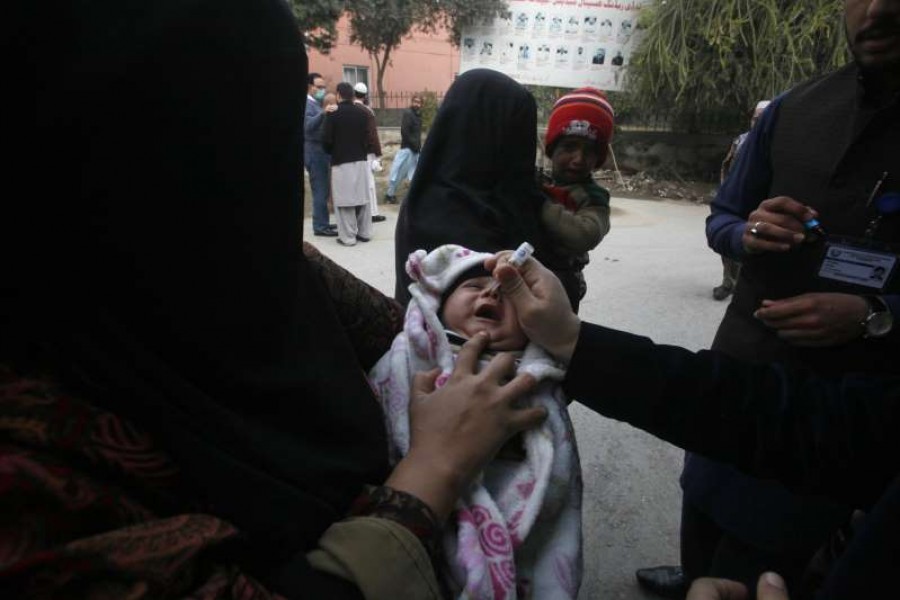After serious setbacks in April led to a cluster of new polio cases, Pakistan is revamping its vaccination strategy in a renewed effort to wipe out the virus.
The country is one of just three — along with Afghanistan and perhaps Nigeria — in which polio is still endemic. Eradication of the virus in Pakistan is crucial to the drive to rid the world of polio, once and for all.
Now, vaccination teams will take a friendlier approach, ask fewer questions, make fewer follow-up visits, and stop recording extensive details about the families they visit, Pakistan’s polio eradication program announced.
Families were intimidated by the questions, and vaccinators spent too much time filling out the registration forms introduced in 2016, said Babar Atta, the polio coordinator in the prime minister’s office, according to local media.
A new vaccination drive is scheduled for the second week of June; thousands of teams will spread out around the country trying to reach almost 40 million children under age 10.
Many vaccinators will go house to house, while others will look for families with young children in refugee camps, train and bus stations, and at highway checkpoints.
Pakistan has had 17 cases of polio paralysis this year; it had only three by this date last year, and only 12 in all of 2018.
In mid-April, widespread panic among parents in Peshawar and the surrounding northern tribal areas forced the suspension of a national immunisation drive. A scaremongering video spread on Twitter, purporting to show students collapsing after getting an expired batch of vaccine.
The video seemed obviously fake. The boys in it flop prone across a hospital bed on cue after the speaker waves his hand; one even makes a funny face on camera. Also, expired vaccine — if it was expired — is harmless.
Nonetheless, “our TV channels found it profitable to cover this nonsense,” Aziz Memon, a textile executive who leads Rotary International’s involvement in Pakistan’s anti-polio campaign, said in an interview in New York. “It became a national event.”
Rumours spread that 50 children had died; mosques used their loudspeakers to tell parents to rush their children to medical care. Hospitals were swamped as more than 25,000 children arrived.
“No one had died,” Memon said. “But we had to call everything off.”
Local politics were behind the scare, he said. District elections were underway and the conservative Jamaat-e-Islami party was trying to discredit the polio campaign, which is supported by Prime Minister Imran Khan’s Tehreek-e-Insaf party.
The man speaking in the video was arrested. To restore confidence, Memon added, the district health and communications ministers appeared on television giving vaccine drops to their own children.
Because suspicion of the campaign remains high in some areas — vaccinators have been accused of marking targets for American drones — interactions with families will now be briefer and less intrusive. Residents will be asked only how many children are in the household and whether they have been vaccinated.
In Pakistan, extended families often live in large compounds; previously, they were asked about all couples inside, whether they were married, how many children each couple had, and who was pregnant. Sometimes, the police arrested families who refused vaccinations.
“That was not helpful,” Memon said. “If you drag people to the police station, they feel insulted. Now, we will have a friendly chat. You don’t have to challenge the refusers, you give them a pep talk and encourage the religious leaders to persuade them.”
In early April, a campaign worker trying to persuade a family to vaccinate was shot dead, apparently by an 18-year-old family member who then fled to nearby Afghanistan.
As compensation, Rotary International gave the family of the campaign worker, Wajid Ali, 32, about $3,300 (Dh12,119), and the local government promised his brother a job.
In an encouraging sign, Memon said, the polio virus is no longer found in sewage samples in Karachi, Pakistan’s biggest city, so transmission there may have been halted.
Polio transmission has never been interrupted in Pakistan and Afghanistan; most of the cases are in the mountainous districts along the border, where government control is weak.
Nigeria has not had a confirmed polio paralysis case since 2016, but it takes at least three years without confirmed cases despite vigorous surveillance before a country is declared polio free.


